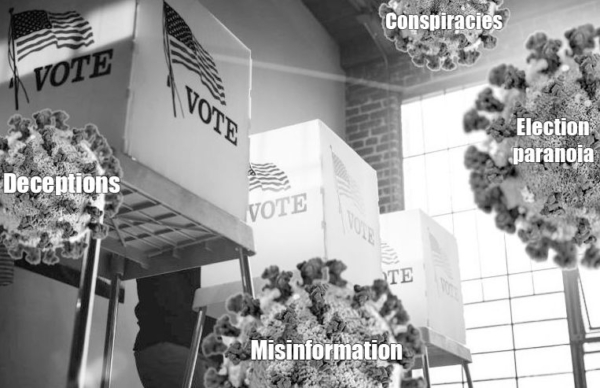State officials move to curb another dangerous virus that threatens North Carolina – ncpolicywatch.com
 As the global pandemic has reminded us with tragic ferocity in recent years, viruses can, despite our best efforts, be enormously destructive and hard to contain – especially as our world has grown ever-more-crowded and interconnected.
As the global pandemic has reminded us with tragic ferocity in recent years, viruses can, despite our best efforts, be enormously destructive and hard to contain – especially as our world has grown ever-more-crowded and interconnected.
And sadly, that goes not just for physical viruses like COVID-19, but viruses of the mind as well. In the era of instant global communication, it’s easier than ever for ideas – even delusional lies and fantasies – to spread like wildfire and do enormous damage before they are exposed and debunked.
As University of Kansas journalism instructor Eric Thomas observed in a fine recent essay for the Kansas Reflector, the term we have come to use most often to describe this phenomenon – “conspiracy theories” – is almost always a misnomer. To dignify, for instance, the monstrous lies and delusions of deeply disturbed and dishonest individuals like Alex Jones with such a term, Thomas notes, is to pervert the English language.
When journalists use the word “theory,” he points out, it implies that there is some plausibility to an idea for readers to consider and weigh. But, of course, when Jones claimed that the Sandy Hook elementary school massacre was faked, he wasn’t propounding a theory; he was telling a blatant and hugely destructive lie.
As Thomas writes:
Journalists have a duty to spotlight deceptions — especially lies that are elaborate, public and persuasive. These are not conspiracy theories.”
For another classic example of this phenomenon at work, see the paranoid and demonstrably false beliefs that have come to afflict so many Donald Trump supporters with respect to the 2020 presidential election and the issue of election integrity more generally.
Across the country, peddlers of crazy “theories” have been spreading lies that the contest was somehow stolen, working to intimidate election officials and would-be voters with new criminal laws, gain access to voting machine data, and attempting to insert themselves into subsequent elections in search of imaginary corruption. The poster children states for this alarming phenomenon are states that Trump narrowly lost in 2020 – Arizona, Georgia, Michigan, Wisconsin – but even here in North Carolina, a state he won in 2020, Trump-inspired activists and “observers” have pursued an aggressive campaign to harass election officials, invade polling sites and even to inspect voting machines.
Indeed, as Policy Watch reporter Lynn Bonner reported last week, a State Board of Elections survey of local boards after the May primary revealed numerous such incidents:
Fifteen county elections officials reported in the survey that they had some problems with observers – some identified as Republican observers – during the primary. Some of the violations were minor, such as an observer talking to a voter they knew. Others reported that observers tailed elections workers driving from polling places to elections headquarters, wanted to take pictures at polling sites, interfered with voters, and distracted poll workers.”
Other incidents were more serious. In Wayne County, an observer had to be ejected when she tried to block a voter from inserting his ballot into a tabulator. Republican observers also objected to curbside voting – wrongfully calling it “ballot harvesting.”
In Alleghany County, an observer got into an altercation with a voter. In Davidson County, observers argued that they should be able to stand behind machines to watch people vote. Poll workers in Pasquotank reported being intimidated.
As Policy Watch reporter Clayton Henkel reported in May, Surry County has also been a particular hotbed of election paranoia, with Trump loyalists repeatedly spreading wild and unsubstantiated claims.
But all across the state and nation, reports continue to emerge of election officials and volunteers being confronted and harassed, and in many instances, abandoning their vitally important work in response.
Thankfully, as Bonner also reported, the state board has taken the results of its survey to heart, recognized the danger such paranoid actions pose, and proposed a new and modest set of security measures that would keep election observers at a safe distance, protect poll workers, and ensure voting integrity.
As she explains, election observers aren’t supposed to talk to voters or elections workers, except for the chief judge. They are supposed to be in an area of the polling place where they can see and hear the interactions between pollworkers and voters, but they aren’t allowed to enter a voting booth, to try to look at ballots, or to take pictures.
The new proposal says observers shouldn’t be close enough to documents to see confidential voter information or ballots, must stay in a designated area, and can’t use doors designated for precinct officials or one-stop workers. Observers who create a disruption by walking in and out of a polling place repeatedly during a four-hour shift could be removed by the chief judge.
The bottom line: It’s a sad commentary on the state of our politics and the paranoia that currently grips so many Americans that they would be necessary, but let’s hope these simple and commonsense rules are finalized soon and act, like a vaccine, to slow the spread of these dangerous delusions that threaten our democracy.
This article has been archived for your research. Find the original article here.


